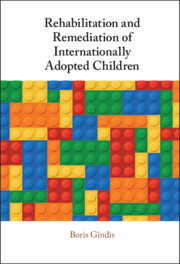Book contents
- Rehabilitation and Remediation of Internationally Adopted Children
- Rehabilitation and Remediation of Internationally Adopted Children
- Copyright page
- Contents
- Acknowledgments
- Introduction
- Chapter 1 Internationally Adopted Children
- Chapter 2 Developmental, Neuropsychological, Psychoeducational, and “Dynamic” Assessment of Internationally Adopted Children
- Chapter 3 Differential Diagnoses and the Structure of School-Based Recommendations for Internationally Adopted Children
- Chapter 4 Developmental Trauma Disorder Rehabilitation in Internationally Adopted Children
- Chapter 5 Cognitive Remediation of Internationally Adopted Children in School and Family
- Chapter 6 Language Remediation of Internationally Adopted Children
- Chapter 7 Academic Remediation of Internationally Adopted Children
- Chapter 8 Creation of Social and Cultural Competence in Internationally Adopted Children
- Chapter 9 Therapeutic Parenting as a Major Force in Rehabilitation and Remediation of Internationally Adopted Children
- Chapter 10 Transitioning to Adulthood Using the Individual Transitional Plan
- Conclusion
- Appendix
- References
- Index
Conclusion
The Art of the Possible – Recovery after Trauma
Published online by Cambridge University Press: 08 October 2021
- Rehabilitation and Remediation of Internationally Adopted Children
- Rehabilitation and Remediation of Internationally Adopted Children
- Copyright page
- Contents
- Acknowledgments
- Introduction
- Chapter 1 Internationally Adopted Children
- Chapter 2 Developmental, Neuropsychological, Psychoeducational, and “Dynamic” Assessment of Internationally Adopted Children
- Chapter 3 Differential Diagnoses and the Structure of School-Based Recommendations for Internationally Adopted Children
- Chapter 4 Developmental Trauma Disorder Rehabilitation in Internationally Adopted Children
- Chapter 5 Cognitive Remediation of Internationally Adopted Children in School and Family
- Chapter 6 Language Remediation of Internationally Adopted Children
- Chapter 7 Academic Remediation of Internationally Adopted Children
- Chapter 8 Creation of Social and Cultural Competence in Internationally Adopted Children
- Chapter 9 Therapeutic Parenting as a Major Force in Rehabilitation and Remediation of Internationally Adopted Children
- Chapter 10 Transitioning to Adulthood Using the Individual Transitional Plan
- Conclusion
- Appendix
- References
- Index
Summary
The recovery from an adverse childhood experience is contingent upon effective and focused scaffolding efforts from the “village” of parents, teachers, community helpers, and mental health professionals working as a team. The major idea of the book is that IA children need a comprehensive and systematic rehabilitation/remediation that is centered on addressing basic neurophysiological needs (sensory integration, self-regulation of emotional state, attention, and other high psychological functions along with effective techniques of relaxation) and proceeds with cognitive, language, and academic remediation to the higher forms of socialization and acculturation. The very diversity of the adoption outcomes points to the contribution of the children’s own biological and psychological characteristics and variation in the quality of their social//cultural rehabilitation, remediation, and support. The issue of methodology in rehabilitation and remediation is crucial at this stage of international adoption, where older (later-adopted) children constitute the majority. The desired outcome of research in the field of international adoption is to provide the proper means of scaffolding former institutional residents to the status of productive, self-sufficient, emotionally stable, and law-abiding members of our society.
- Type
- Chapter
- Information
- Publisher: Cambridge University PressPrint publication year: 2021



